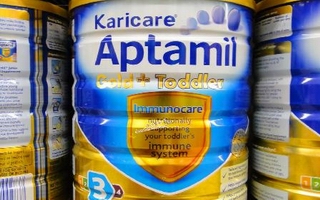 According to the Financial Times, Chinese buyers have been buying up cans of formula across the globe following the food safety scandals in the domestic market, starting with the melamine-spiked milk of 2008 that killed six babies and left 300,000 sick.
According to the Financial Times, Chinese buyers have been buying up cans of formula across the globe following the food safety scandals in the domestic market, starting with the melamine-spiked milk of 2008 that killed six babies and left 300,000 sick.Such is demand for overseas-manufactured formula that it has prompted a wave of smuggling rings and extortionate prices: cans are available online for Rmb150-Rmb200 ($24-$32).
Production of formula is also under pressure, as a drought in New Zealand – the biggest provider in the global dairy trade – forces up the cost of raw milk powder.
The baby milk supplier Danone has gone so far as to ask the UK supermarket chain Asda to implement a two-tins-of-infant-formula limit on customers, and other UK supermarkets have also begun restricting customers to two tins of infant milk formula at a time.
“This is being done at the request of the manufacturers who believe it’s possible that some organised groups of customers are buying up products in unusually large quantities for export,” said Richard Dodd, of the British Retail Consortium.
The frenzy for formula has forced governments to step in. In Hong Kong, where shelves of formula are regularly cleared by mainland visitors, smugglers have been arrested for carrying more than 1.8kg out of the city.
The Financial Times reports that some travel agents have even directly linked rising flight prices to certain destinations – such as Australia – to the rising number of mainland tourists stocking up on milk powder.
Danone has also taken steps to prevent profits being re-routed into smugglers’ hands by introducing official sales of Dutch-made formula on Chinese online platform TMall.
The French food producer said the cap on sales to individual shoppers in the UK was designed ‘to prevent … bulk-buying baby milk for commercial purposes. We understand that the increased demand is being fuelled by unofficial exports to China to satisfy the needs of parents who want western brands for their babies.”





